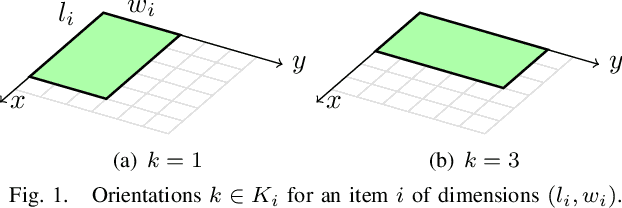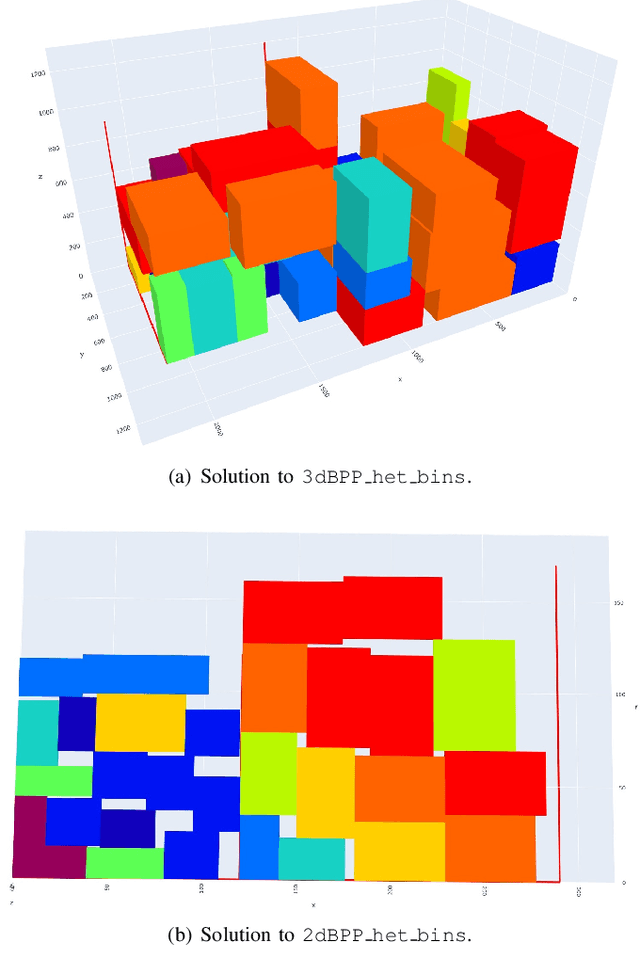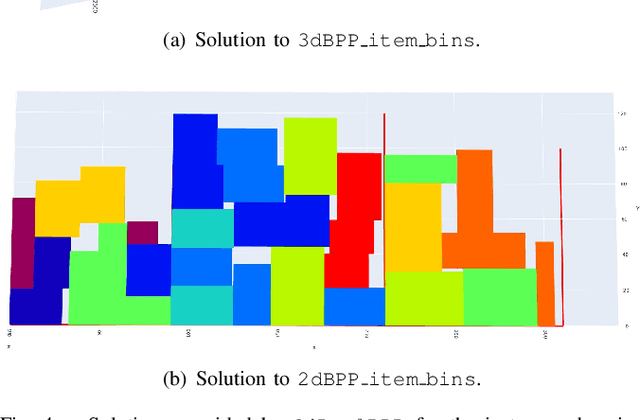Antón Asla
Optimizing Package Delivery with Quantum Annealers: Addressing Time-Windows and Simultaneous Pickup and Delivery
Apr 02, 2025



Abstract:Recent research at the intersection of quantum computing and routing problems has been highly prolific. Much of this work focuses on classical problems such as the Traveling Salesman Problem and the Vehicle Routing Problem. The practical applicability of these problems depends on the specific objectives and constraints considered. However, it is undeniable that translating complex real-world requirements into these classical formulations often proves challenging. In this paper, we resort to our previously published quantum-classical technique for addressing real-world-oriented routing problems, known as Quantum for Real Package Delivery (Q4RPD), and elaborate on solving additional realistic problem instances. Accordingly, this paper emphasizes the following characteristics: i) simultaneous pickup and deliveries, ii) time-windows, and iii) mobility restrictions by vehicle type. To illustrate the application of Q4RPD, we have conducted an experimentation comprising seven instances, serving as a demonstration of the newly developed features.
Exploring Utility in a Real-World Warehouse Optimization Problem: Formulation Based on Quantun Annealers and Preliminary Results
Sep 15, 2024


Abstract:In the current NISQ-era, one of the major challenges faced by researchers and practitioners lies in figuring out how to combine quantum and classical computing in the most efficient and innovative way. In this paper, we present a mechanism coined as Quantum Initialization for Warehouse Optimization Problem that resorts to D-Wave's Quantum Annealer. The module has been specifically designed to be embedded into already existing classical software dedicated to the optimization of a real-world industrial problem. We preliminary tested the implemented mechanism through a two-phase experiment against the classical version of the software.
Solving a Real-World Package Delivery Routing Problem Using Quantum Annealers
Mar 27, 2024Abstract:Research focused on the conjunction between quantum computing and routing problems has been very prolific in recent years. Most of the works revolve around classical problems such as the Traveling Salesman Problem or the Vehicle Routing Problem. Even though working on these problems is valuable, it is also undeniable that their academic-oriented nature falls short of real-world requirements. The main objective of this research is to present a solving method for realistic instances, avoiding problem relaxations or technical shortcuts. Instead, a quantum-classical hybrid solver has been developed, coined Q4RPD, that considers a set of real constraints such as a heterogeneous fleet of vehicles, priority deliveries, and capacities characterized by two values: weight and dimensions of the packages. Q4RPD resorts to the Leap Constrained Quadratic Model Hybrid Solver of D-Wave. To demonstrate the application of Q4RPD, an experimentation composed of six different instances has been conducted, aiming to serve as illustrative examples.
A Quantum Computing-based System for Portfolio Optimization using Future Asset Values and Automatic Reduction of the Investment Universe
Sep 27, 2023Abstract:One of the problems in quantitative finance that has received the most attention is the portfolio optimization problem. Regarding its solving, this problem has been approached using different techniques, with those related to quantum computing being especially prolific in recent years. In this study, we present a system called Quantum Computing-based System for Portfolio Optimization with Future Asset Values and Automatic Universe Reduction (Q4FuturePOP), which deals with the Portfolio Optimization Problem considering the following innovations: i) the developed tool is modeled for working with future prediction of assets, instead of historical values; and ii) Q4FuturePOP includes an automatic universe reduction module, which is conceived to intelligently reduce the complexity of the problem. We also introduce a brief discussion about the preliminary performance of the different modules that compose the prototypical version of Q4FuturePOP.
Solving Logistic-Oriented Bin Packing Problems Through a Hybrid Quantum-Classical Approach
Aug 21, 2023



Abstract:The Bin Packing Problem is a classic problem with wide industrial applicability. In fact, the efficient packing of items into bins is one of the toughest challenges in many logistic corporations and is a critical issue for reducing storage costs or improving vehicle space allocation. In this work, we resort to our previously published quantum-classical framework known as Q4RealBPP, and elaborate on the solving of real-world oriented instances of the Bin Packing Problem. With this purpose, this paper gravitates on the following characteristics: i) the existence of heterogeneous bins, ii) the extension of the framework to solve not only three-dimensional, but also one- and two-dimensional instances of the problem, iii) requirements for item-bin associations, and iv) delivery priorities. All these features have been tested in this paper, as well as the ability of Q4RealBPP to solve real-world oriented instances.
 Add to Chrome
Add to Chrome Add to Firefox
Add to Firefox Add to Edge
Add to Edge